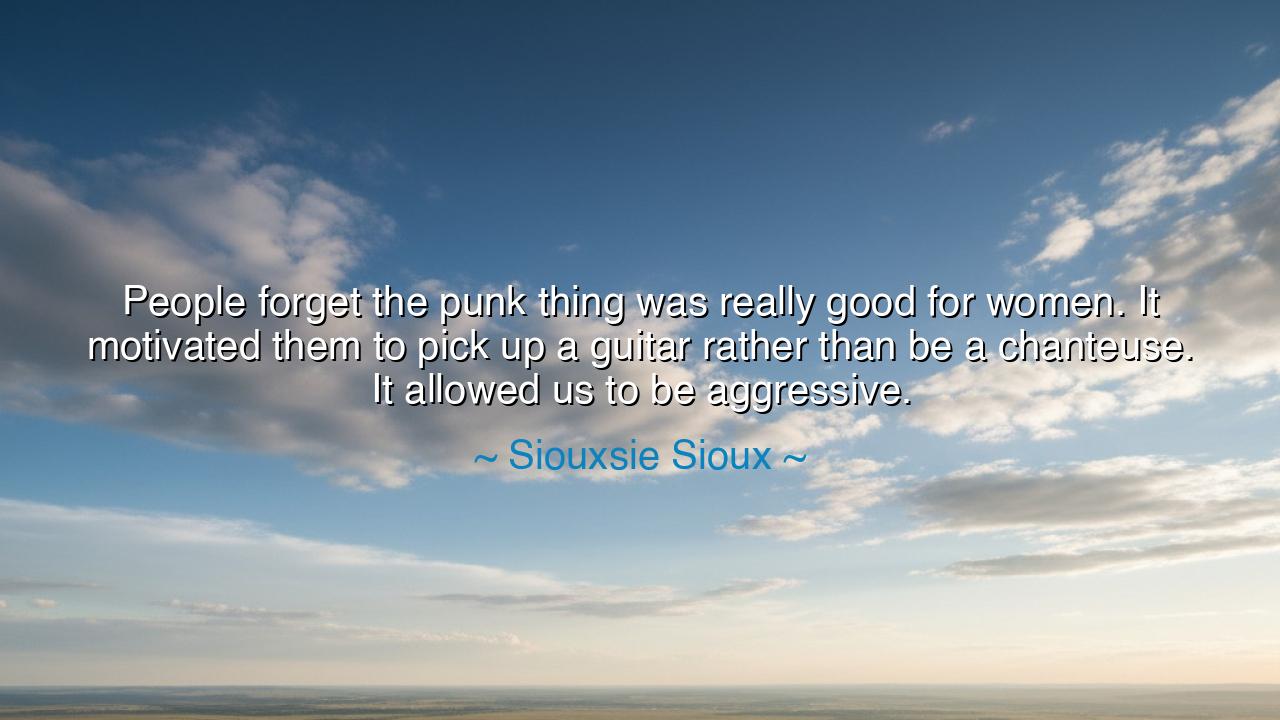
People forget the punk thing was really good for women. It
People forget the punk thing was really good for women. It motivated them to pick up a guitar rather than be a chanteuse. It allowed us to be aggressive.






The words of Siouxsie Sioux — “People forget the punk thing was really good for women. It motivated them to pick up a guitar rather than be a chanteuse. It allowed us to be aggressive.” — blaze with the spirit of rebellion. They remind us that art is not merely a song sung sweetly, but a battlefield upon which identity, freedom, and power are claimed. In the age of punk, the stage became more than a platform for melody; it became a weapon, and the guitar the sword of those who refused to bow.
Her words testify to a transformation. For centuries, women in music were expected to sing softly, to charm as a chanteuse, to be vessels of beauty rather than flames of fury. Yet the rise of punk tore down that expectation. It demanded rawness, not polish; confrontation, not compliance. It declared that to scream, to clash, to rage, was as holy as to sing, and in doing so it gave women the right to channel their deepest storms without apology.
Consider the tale of The Slits, a band of young women who dared to crash into the male-dominated punk scene of the 1970s. With jagged sounds and fearless stage presence, they shattered stereotypes, wielding their instruments like weapons against tradition. They did not wait to be invited into the halls of music; they broke the doors themselves. In their courage, they embodied the truth of Sioux’s words: that punk gave women not only a voice, but the power to roar.
The meaning is clear: aggression, when born of oppression, becomes liberation. To pick up the guitar was not merely to make music, but to seize power, to refuse the role of decoration, and to demand a place among the warriors of sound. Where once women were expected to stand still in the spotlight, now they leapt, shouted, and created a new space where no one could deny their presence.
Let these words be remembered, not only as history but as prophecy. Every generation must find its own punk, its own rebellion that allows the silenced to speak, the timid to strike, the oppressed to rise. For music, like life, is not meant only for sweetness — it is meant for truth, for fire, and for the courage to be aggressive when the world commands silence.






TTDich Duong Thanh Thuy
It’s fascinating to think about how punk allowed women to embrace a more aggressive, active role in music rather than being relegated to passive, often sexualized roles. But does this empowerment in punk translate to other areas of society as well? How much has the legacy of punk influenced other industries in breaking down gendered expectations? Are women still finding ways to assert themselves through aggression and creativity, or is the punk movement something from the past?
TTNguyen Thi Trang
Siouxsie Sioux's reflection on the punk movement being beneficial for women resonates with me. Punk gave women an avenue to express themselves in ways that went beyond traditional femininity, allowing them to be more than just singers—it gave them the chance to be creators and rebels. But does that empowerment still hold in today’s music industry? Are there still barriers for women that punk helped to break down, or have they been replaced by new ones?
MMeo
This is an interesting perspective on punk's impact on women in music. Punk wasn't just a genre—it was a revolution, and for women, it was an opportunity to redefine how they could participate in a male-dominated scene. By embracing aggression and creativity, women could reclaim their space in rock. I wonder though, how much of this empowerment was available to all women, or did it cater mostly to those already on the fringe?
HNHan Nguyen
Siouxsie Sioux’s statement highlights how punk rock helped women break out of traditional roles in music. I completely agree—punk gave women a voice in a space that was often dominated by men. But is it possible that we still undervalue the significance of this shift in empowering women to take control of their creative expression? How much did punk contribute to the evolution of women in music beyond just the 'chanteuse' archetype?